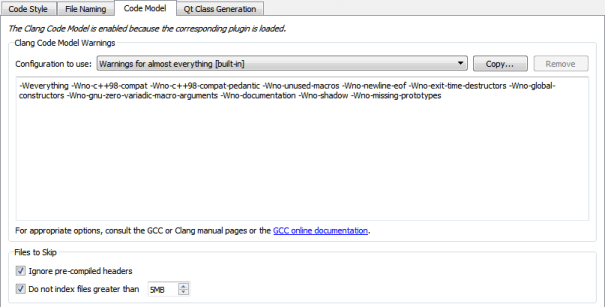Parsing C++ Files with the Clang Code Model
The code model is the part of an IDE that understands the language you are using to write your application. It is the framework that allows Qt Creator to provide the following services:
- Code completion
- Syntactic and semantic highlighting
- Navigating in the code by using the locator, following symbols, and so on
- Inspecting code by using the class browser, the outline, and so on
- Diagnostics and tooltips
- Finding and renaming symbols
- Refactoring actions
Qt Creator comes with an experimental plugin that provides some of these services for C++ on top of Clang.
About the Clang Code Model
The Clang project provides libraries for parsing C language family source files. The feedback you get through warning and error markers is the same as a compiler will give you, not an incomplete set or a close approximation, as when using the built-in Qt Creator code model. Clang focuses on detailed information for diagnostics, which is really useful if the code contains typos, for example.
Clang keeps up with the development of the C++ language. At the time of this writing, it supports C++98/03, C++11, C++14, C89, C99, Objective-C, and Objective-C++.
On the downside, for large projects using Clang as code model is slower than using the built-in code model. Clang does not need to generate object files, but it still needs to parse and analyze the source files. For small projects that only use STL, this is relatively fast. But for larger projects that include several files, processing a single file and all the included files can take a while.
The following services are currently implemented in the experimental Clang code model plugin:
- Code completion
- Syntactic and semantic highlighting
- Diagnostics
To use the plugin, you must build it and configure it in Qt Creator.
Activating Clang Code Model
If you build Qt Creator yourself, ensure that the plugin is also built, as described in the Qt Creator README file.
To activate the plugin:
- Select Help > About Plugins > C++ > ClangCodeModel to enable the plugin.
- Restart Qt Creator to be able to use the plugin.
If you build Qt Creator yourself, add
${LLVM_INSTALL_DIR}\binto thePATHvariable so the LLVM libraries will be found on startup.
Configuring Clang Code Model
To specify settings for the Clang code model:
- Select Tools > Options > C++ > Code Model.

- In the Configuration to use list, configure the diagnostics that Clang should issue.
You can either select one of the predefined configurations, or create a copy of a configuration and edit it to fit your needs:
- Pedantic Warnings uses the
-Wpendanticoption that requests all the warnings demanded by strict ISO C and ISO C++. - Warnings for Questionable Constructs combines the
-Walland-Wextraoptions to request all warnings about easily avoidable questionable constructions and some additional warnings. - Warnings for Almost Everything uses the
-Weverythingoption with negative options to suppress some warnings.
You can edit the predefined configurations to request specific warnings beginning with
-W. Each of these warnings also has a negative version that begins with-Wno. Keep in mind that some options turn on other options. For more information, see Options to Request or Suppress Warnings or the GCC or Clang manual pages. - Pedantic Warnings uses the
- To process pre-compiled headers, deselect the Ignore pre-compiled headers check box.
- To avoid out-of-memory crashes caused by indexing huge source files that are typically auto-generated by scripts or code, the size of files to index is limited to 5MB by default. To adjust the limit, edit the value for the Do not index files greater than check box. To index all files, deselect the check box.
© 2016 The Qt Company Ltd. Documentation contributions included herein are the copyrights of their respective owners. The documentation provided herein is licensed under the terms of the GNU Free Documentation License version 1.3 as published by the Free Software Foundation. Qt and respective logos are trademarks of The Qt Company Ltd in Finland and/or other countries worldwide. All other trademarks are property of their respective owners.
